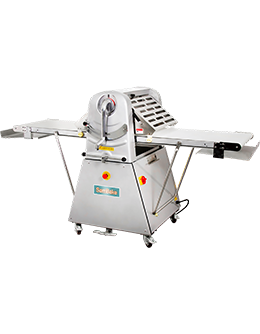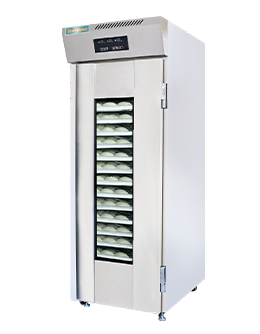Dough Sheeter
What is a Dough Sheeter?

Types of Dough Sheeters
Manual Dough Sheeters
These are simple, hand-cranked machines suitable for small bakeries or home use. They're lightweight, affordable, and easy to operate, but they require manual effort to run. Ideal if you prefer a hands-on approach and have limited space.
Electric Dough Sheeters
Powered by motors, these models automate the rolling process. They are perfect for medium-sized bakeries that need to process dough quickly without exerting too much physical effort. They usually come with adjustable thickness settings and are more consistent than manual models.
Commercial Dough Sheeters
Built for high-volume production, these heavy-duty machines are designed to handle large quantities of dough daily. They feature robust motors, larger rollers, and higher capacity, making them suitable for large bakeries, pizzerias, and food manufacturers. They often come with advanced features like programmable settings and easy cleaning systems.
How Does a Dough Sheeter Work?
At its core, a dough sheeter uses rollers to flatten and stretch dough uniformly. You feed the dough into the machine, select your desired thickness, and the rollers do the rest. As the dough passes through, it gets flattened and elongated until it reaches the perfect size and thickness. Some models allow multiple passes, gradually reducing the dough to the desired consistency. The process is quick, consistent, and minimizes manual effort—making it a baker's best friend.
Key Features to Look For
Adjustable Thickness Settings
This feature lets you set the exact thickness you want, from paper-thin to thick. It’s essential for customizing your dough for different recipes.
Rollers & Plates
Material matters—stainless steel rollers are durable and easy to clean, while silicone-coated rollers reduce sticking. Also, consider the size of the rollers based on your typical dough size.
Capacity & Size
Match the machine’s capacity with your production volume. Small models suit home bakers; larger ones are better for commercial use.
Ease of Use & Maintenance
Look for user-friendly controls, simple assembly, and easy cleaning features to save time and effort.
Benefits of Using a Dough Sheeter
Consistency
Say goodbye to uneven dough! The sheeter ensures every batch is uniform, leading to better baking results.
Speed & Efficiency
It drastically reduces preparation time, letting you produce more in less time. Perfect for busy mornings or large orders.
Improved Product Quality
Consistent thickness means better texture, appearance, and overall quality of your baked goods.
Common Industries Using Dough Sheeters
Bakeries
From artisan bread to croissants, dough sheeters streamline production.
Pizzerias
Achieve perfectly thin and even pizza bases every time.
Food Manufacturing
Large-scale bakeries and food producers rely on these machines for mass production of dough-based products.
How to Choose the Right Dough Sheeter
Capacity Needs
Estimate your daily dough volume. Small bakeries need smaller models; large operations require industrial machines.
Budget
Set a budget considering long-term savings. A good dough sheeter is an investment that pays off in efficiency.
Space & Layout
Measure your workspace. Ensure the machine fits comfortably and allows easy access for operation and cleaning.
Maintenance & Care Tips
Regular Cleaning
Clean rollers and surfaces after each use to prevent dough buildup and bacteria growth.
Mechanical Checks
Lubricate moving parts and inspect belts periodically to keep the machine running smoothly.
Storage & Handling
Store in a dry, clean area. Handle with care during transportation and storage to avoid damage.
Top Brands & Models
Popular Brands
Hobart, Globe, Sirman, Berkel, and Famag are renowned for quality and durability.
Recommended Models
- Hobart N50: Compact and reliable for small bakeries
- Globe SP50: Versatile with adjustable thickness
- Sirman G200: Heavy-duty with high capacity for commercial use
How to Use a Dough Sheeter Effectively
Preparation
Ensure your dough is properly rested and at the right temperature. Cold dough is easier to work with.
Operation Tips
Start with a lower thickness setting, feed the dough gently, and gradually increase as needed. Use consistent pressure for uniform results.
Troubleshooting
If dough sticks or rollers jam, clean the machine thoroughly and check for worn parts. Adjust the dough consistency if necessary.
Safety Tips
Safe Operation
Always keep fingers clear of rollers. Use safety guards if available. Turn off the machine before cleaning.
Maintenance Safety
Disconnect power before maintenance. Use appropriate tools and follow manufacturer instructions.
Cost & Investment
Price Range
Manual models start around $200, while commercial machines can go over $10,000. Consider your volume and budget.
Long-term Savings
Though some models are pricey upfront, the time saved and improved product quality make them worthwhile investments.
Customer Reviews & Testimonials
Many users praise dough sheeters for their consistency and speed. Home bakers love compact models, while professional bakers swear by heavy-duty machines that withstand daily use.
Conclusion
A dough sheeter is an invaluable tool that elevates your baking game. Whether you're making perfect pizza bases or flaky pastries, investing in the right machine can save you time, effort, and ensure top-quality products. Remember to consider your needs, budget, and space before choosing a model. With proper care and operation, your dough sheeter will serve you well for years to come. Happy baking!
FAQs
1. Can I use a dough sheeter at home?
Absolutely! There are smaller, more affordable models perfect for home kitchens. They offer professional results without taking up too much space.
2. How often should I clean my dough sheeter?
It's best to clean it after every use to prevent dough buildup and maintain hygiene.
3. Is a dough sheeter suitable for gluten-free dough?
Yes, but gluten-free dough can be sticky or delicate. Adjust the dough consistency and cleaning process accordingly.
4. How long does a dough sheeter last?
With regular maintenance, a well-made dough sheeter can last many years—sometimes decades!
5. Can I buy a used dough sheeter?
Yes, but inspect it thoroughly for wear and tear. Make sure it operates smoothly and all parts are in good condition before purchasing.
- *Name
- *Title
- *Content
- Name:
- Vickey
- Tel:
+86-18862554041
- Email:
- sales@sambake.com
- Address:
- Xinxiang Industrial Park,Wuxi City,Jiangsu China






